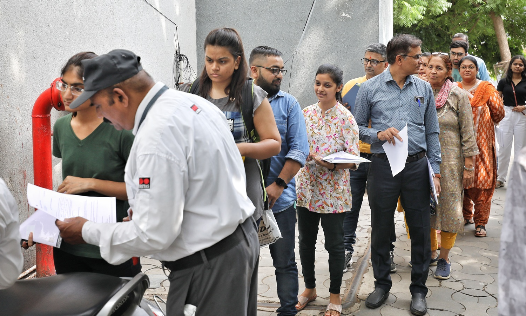Payment is being processed. Please do not refresh or close this page until your payment is complete.
 Book an Appointment
Book an Appointment

In a surprising turn of events, students with weak academic profiles, significant study gaps and a history of past refusals now have a “golden opportunity” to secure student visas for Canada, according to immigration consultants.
Owing to recent changes in Canada’s student visa policies, the demand for visas has dramatically dropped in the past few months, especially among high-achieving students, creating a favourable environment for those who have traditionally faced hurdles in their attempts.
The number of students from Punjab applying to Canadian colleges has dropped significantly, with businesses in the student visa sector reporting only 20 per cent of the volume compared to last year.
“If 100 students were going to Canada last year, now it’s down to just 20,” said an immigration consultant. This decline is largely attributed to changes in Canada’s student visa rules and policies that have caused students to hesitate, as many are awaiting further updates while exploring other destinations like the US, UK, and Germany.
However, for students with weaker academic profiles—such as low scores in their 10+2 exams, gaps in their education, or low scores in English proficiency tests like the IELTS—the current situation presents a unique chance, according to experts.
Tirath Singh of Pinnacle Immigration, a consultant with a long experience with Canadian student visa applications, said, “Canada has kept its doors open for students with considerable study gaps or multiple visa refusals. Unlike the UK or Australia, which often reject applicants with gaps after 10+2, Canada is issuing visas for such cases.”
Singh gave the example of a student with a five-year gap after 10+2 who initially sought to study in the UK. “I advised him against it, as the U.K. wouldn’t consider his case due to the gap. But Canada, with its current visa policies, accepted his application,” he said.
Other countries, like Australia and the UK, tend to reject candidates with long educational breaks, while the US still considers them but puts a heavy emphasis on interview performance. Germany, on the other hand, is more open to accepting gaps after graduation rather than after high school.
“The visa success rate for students with study gaps has soared,” Singh said. “We’ve seen cases where students with 10–15 years of study gap were granted visas because they could justify their time away from education, whether they were involved in family businesses or other activities.”
Lower IELTS and PTE scores
Singh also said his firm had helped several students with IELTS scores less than six or low scores in other proficiency tests like the Pearson Test of English (PTE) get student visas.
“Earlier, Canada could be more selective due to the sheer volume of applicants with strong profiles. Now, with a smaller pool to choose from, students with weaker profiles are finding success as long as they can adequately explain their circumstances. The recent visa approvals include students scoring between 4.5 and 5 in one of the four modules of International English Language Testing System (IELTS) exam and obtaining marks between 52 and 56 in the PTE exam, despite the benchmarks being 6 and 60 marks for the IELTS and PTE exams, respectively,” he said.
Aman Parmar of Punjab-based V Point Visa Consultants also said that despite the various restrictions, in 2024, not a single student visa processed through the consultancy was rejected. “Even students with multiple refusals were able to secure visas,” he said.
Significant changes
Canada has not only capped the number of international students from January but also made several other changes like closing the spouse open work permit for most undergraduate courses and mandating provincial attestation letters (PAL) from the province where students seek admission.
Also, most private colleges and other institutions in Canada have been closed for international students under public-private partnership models. Now, only public colleges and institutions are admitting foreign students.
“Because of these restrictions, the rush including from high-achieving students has slowed down and thousands of seats in these institutions remain vacant, creating more opportunities for those who might have been overlooked in the past,” said another consultant.
In the past, most students from Punjab preferred private colleges because there were no strict rules like four-five days of classroom instruction, another consultant said. Most students would then devote more time in a week to work and earn more for the next semester’s fee so that they can apply for Permanent Residency (PR), their ultimate goal, after finishing the course. Now this option is closed, he added.
Source: https://indianexpress.com/article/cities/chandigarh/golden-opportunity-canada-students-study-gaps-weak-profiles-visa-rush-ebbs-9558043/